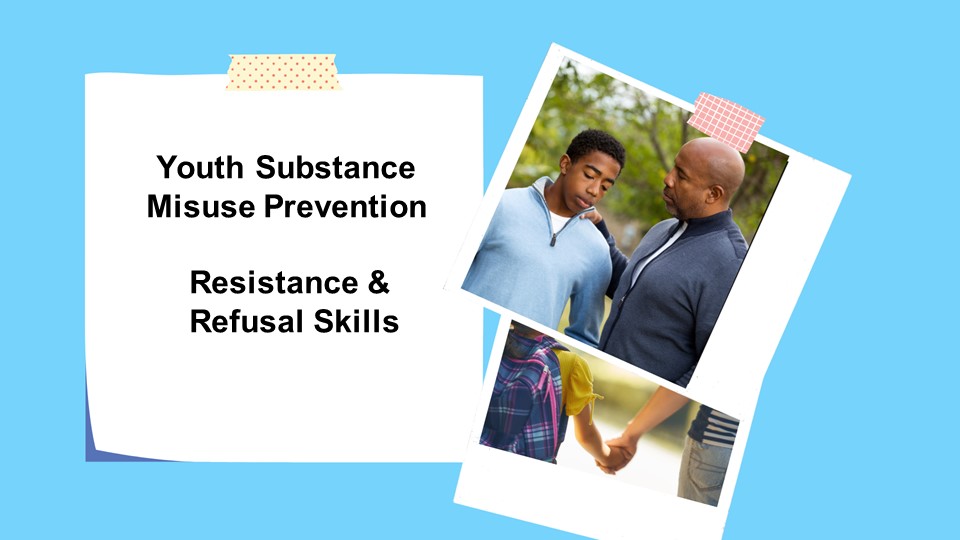Youth ATOD Resistance and Refusal Skills
 Introduction
Introduction
Watch a video presentation or download Powerpoint slides on the information that follows below.
Substance misuse/abuse can have a wide range of negative effects on mental and physical health, including depression, anxiety, and chronic health problems. The skills to avoid drug use at an early age is a critical component of a healthy foundation and is an area that adults who are involved with children need to be proactive about.
Most youth will at some point be confronted with certain levels of peer pressure related to drug and alcohol use. Developing substance use refusal and resistance skills is crucial for young people to successfully navigate these challenges, bypass drug and alcohol use, addictions and other life-altering consequences that may ensue as a result of substance-affected behaviors or decisions.

Benefits of Resistance and Refusal
- By avoiding drug use, young people can maintain their overall health and well-being, and have a much easier path towards achieving their full potential. Youth drug refusal and drug resistance skills can also help young people build positive and supportive relationships with others.
- By avoiding drug use, young people can build healthier relationships with their peers, family members, and community, and will benefit from the positive support and guidance these relationships provide.
- Avoiding drugs also supports better academic performance and career success because substance abuse can lead to decreased motivation, decreased performance, and increased absenteeism which leads to poor educational outcomes and challenges in building a substantial career.

Key Resistance and Refusal Skills to Teach
Teach children techniques that they can use in any particular moment of pressure so that they are prepared in advance. These include:
- Saying no many times and firmly.
- Verbalizing “I do not drink/smoke/vape.”
- Use any excuse, including the expectations of your parents or authority figures “If I ____, my parents will never let me spend time with ____ again.”
- Use your responsibilities to sports or activities as an excuse “I won’t be allowed to play on the team if ____ and they have a zero-tolerance policy. It isn’t worth risking that after all my hard work.”
- Change the subject altogether - begin talking about something else that interests the peer you are interacting with until you can exit the situation.
- Suggest something else “Why don’t we all go ____ instead.”
Building Character and Protective Personal Traits
In addition to techniques youth can use in a particular moment, there are also ways to instill and ensure stronger refusal and resistance skills in youth that can begin years before they may be confronted by a peer-pressure situation. These include characteristics and personal traits that parents, family and teachers can promote and support in children at every stage of development:
Self-awareness
Understanding their own values, beliefs, and motivations can help youth make decisions that align with what's important to them and resist peer pressure to use drugs.
- When kids feel confident and self-assured, they are more likely to seek out positive and supportive relationships, which can provide a strong foundation for avoiding drugs and other negative influences.
- When kids are self-aware, they are better equipped to think through the potential consequences of their actions and make informed decisions. Additionally, self-awareness can help kids understand their strengths and weaknesses and build a positive self-image. Youth who are self-aware are also better equipped to handle stress, anxiety, and other challenges in a healthy way, which will reduce their risk of turning to drugs as a way of coping.
- When kids feel good about themselves, they are less likely to engage in risky behaviors such as drug use in an attempt to feel better or fit in.
Confidence
Feeling confident in their ability to make decisions and communicate them effectively can help youth resist drugs and other negative influences. Confidence can help kids think critically and make informed decisions about their health and well-being.
- When kids have confidence in their own abilities and values, they are more likely to resist peer pressure and make healthy choices. Confidence can also help kids communicate effectively and assertively, which can be critical in resisting peer pressure to use drugs.
- When kids feel confident in their own abilities and opinions, they are better able to stand up for themselves and express their own needs and boundaries. Confidence also builds resilience, which is the ability to bounce back from adversity and cope with stress.
- When kids feel confident in their own abilities and worth, they are better able to handle the challenges of life, including the pressures to use drugs.
Assertiveness
Being able to express their thoughts and feelings in a clear, respectful, and confident manner can help youth refuse offers of drugs and other harmful substances.
Problem-solving
Being able to identify and evaluate options, weigh the pros and cons, and make decisions based on their goals and values can help kids navigate difficult situations and make healthy choices.
Communication
Developing effective communication skills, such as active listening and expressing themselves clearly, can help kids build positive relationships and avoid conflict, including conflicts related to drug use.
Support System
When kids are surrounded with positive, supportive friends and family members, school personnel, and community members, it can provide a source of encouragement and help in difficult situations. They are accountable to more people than just themselves and have people to rely on to discuss challenging decisions.
 Resources
Resources
Below are some online resources for the classroom, for parents and for the community which educate about youth drug refusal and youth drug resistance skills:
- Teen Safe: Collection of relevant resources.
- Drug Free World: This website provides a wealth of resources and information on drug prevention, including videos, articles, and educational materials on drug refusal and drug resistance skills.
- Truth Campaign: This campaign provides information and uses videos and social media to engage youth in taking action against tobacco and tobacco companies.
- National Institute on Drug Abuse (NIDA): NIDA provides a wide range of resources for youth, including interactive tools and games that help young people learn about the dangers of drug abuse and develop effective refusal skills.
- Adolescent Health Collection of Resources
- Partnership to End Addiction: This organization provides online resources and support for families impacted by substance use, including a helpline, educational resources, and an online community for support.
- SAMHSA's Preventing Drug Abuse Among Children and Adolescents: This resource, provided by the Substance Abuse and Mental Health Services Administration (SAMHSA), includes information and strategies for preventing drug abuse, as well as online resources and support for families.
- TalktoFrank: What to do when feeling pressured to take drugs.
- Kelty Mental Health Resource Centre: Resources are available on this website for youth and teens about substance use, including in-depth information on various substances and concurrent disorders, as well as steps to seek help.
- Peer Pressure
- Videos

